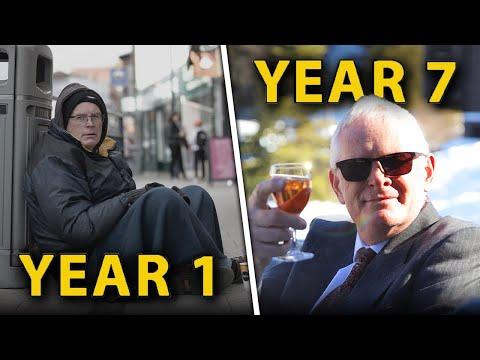I had always dreamed of retiring early, but starting from zero, it seemed like an impossible task. I remember the day I faced the stark reality of my financial situation. My debts were mounting, my savings were nonexistent, and I was deep in my twenties with no clear path to a secure future. My friends were getting their lives together, investing, and planning for the future, while I was struggling just to make ends meet. It was a wake-up call that I couldn’t ignore. I knew I had to act fast if I wanted to retire in seven years with nothing to my name.
The first thing I did was set clear, actionable goals. I needed to understand that my journey from zero to a secure retirement would require a structured plan. I started by creating a detailed budget. This wasn’t just about tracking my spending; it was about rethinking my financial habits. I meticulously logged every penny I spent, cutting down on non-essential expenses. Dining out, impulse buys, and unnecessary subscriptions were the first to go. It was a challenging transition, but necessary.
Next, I focused on increasing my income. I took on side jobs and freelanced whenever I could. I discovered that the gig economy had plenty of opportunities, from writing and graphic design to tutoring and delivery services. Each extra dollar I earned was a step closer to my goal. Additionally, I began investing in myself by acquiring new skills that could lead to higher-paying job opportunities. I took online courses and attended workshops to enhance my expertise in areas that were in demand.
With my budget streamlined and my income on the rise, the next step was to save and invest strategically. I knew that simply saving money wouldn’t be enough; I needed to make it work for me. I started by opening a high-yield savings account to earn more on the money I managed to save. Then, I researched investment options. I opted for low-cost index funds and ETFs, which offered diversification and had historically delivered solid returns. I also considered real estate investments. Although initially daunting, I educated myself on property management and rental income, and eventually, I was able to purchase a small rental property that generated passive income.
Simultaneously, I had to address my debts. I prioritized paying off high-interest credit card debt first. It was a financial burden that was holding me back. By consolidating my debts into a lower-interest loan and making extra payments whenever possible, I was able to gradually eliminate them. This process was tedious, but each debt paid off was a significant victory and boosted my morale.
Another crucial aspect of my plan was building an emergency fund. Life is unpredictable, and having a financial cushion was essential. I aimed to save at least three to six months’ worth of living expenses. This fund was not just for emergencies but also provided me with the flexibility to take calculated risks, such as investing in new opportunities or exploring entrepreneurial ventures.
Networking and mentorship played a pivotal role in my journey. I reached out to individuals who had successfully navigated similar financial paths. They offered invaluable advice and guidance that helped me avoid common pitfalls. Attending financial seminars and joining investment groups allowed me to stay updated on market trends and make informed decisions.
Throughout these seven years, my approach had to be flexible. Market conditions changed, my personal circumstances evolved, and new opportunities arose. I learned to adapt my strategies and stay focused on my long-term goal. I regularly reviewed and adjusted my budget, reassessed my investments, and sought professional advice when needed.
One of the most significant changes in my mindset was embracing financial discipline and patience. The journey was not easy, and there were times when progress seemed slow. However, I reminded myself of the end goal and remained committed to my plan. Every small achievement, whether it was paying off a debt or making a profitable investment, contributed to my overall success.
By the end of the seventh year, I had transformed my financial situation beyond what I initially thought possible. My investments had grown, my debts were cleared, and I had a substantial amount saved up. I had created multiple streams of income and developed a robust financial plan that supported my retirement goals.
The journey from zero to retirement was challenging, but it was incredibly rewarding. It required dedication, strategic planning, and a willingness to make significant lifestyle changes. The key was to start with a clear plan, stay disciplined, and continuously adapt to new circumstances. Looking back, I realize that with determination and smart financial strategies, retiring in seven years from a starting point of zero was not just a dream—it was an achievable reality.
